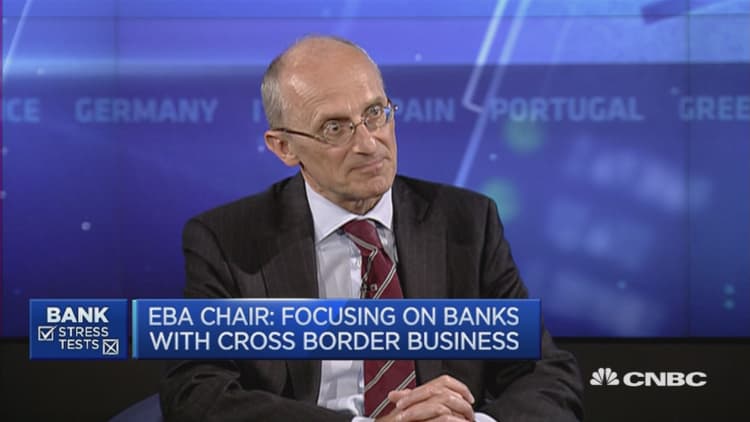
The level of non-performing loans (NPLs) at European Union banks will be in the spotlight as the region's biggest banks face stress tests on Friday.
"We have 1 trillion (euro) of NPLs - it's a big figure," Andrea Enria, chairman of the European Banking Authority (EBA), told CNBC, ahead of stress tests published Friday night which will be a key measure of the region's banks' financial strength.
"The level has started decreasing in all countries. The point is the pace of adjustment. Are we adjusting the levels fast enough? You don't want to be too fast, because then you have a massive capital impasse and fire sale of assets, but you don't want to be too slow, because then the banks would be unable to lend and remain unprofitable for long periods of time."
This is the third time since the credit crisis that stress tests have been carried out. This time, there is no pass/fail mark, and the number of banks being tested is less than half the 123 banks subject to the previous test in 2014. The tests do not include any banks from Greece or Portugal, two other euro zone countries where lenders are struggling. "We have the most important banks in the euro area. That's how the selection was made," Enria said in defense of the concentration on the region's biggest banks.
"The smaller banks will be subject to tests from the relevant authorities which will to some extent rely on our methodology."
The focus has shifted from capital requirements to bad loans on banks' balance sheets.
Enria, who has led the EBA since 2011, told CNBC: "Now this capital strengthening has been successful, the point is now to link it more closely to medium term capital planning, which is what the US authorities have done.
"The non-performing loans is an important element – I would say the missing link – in the adjustment process of European banks."
The results are likely to make somber reading in Italy, where banks like Monte dei Paschi di Siena are struggling with bad debts and may need a bailout from the government.
In the past, they have identified banks which need to raise additional capital.
Raising capital may prove difficult under current stock market conditions. The amount raised by European banks this year so far is 73 percent less than at the same time in 2015, according to Dealogic figures, as investor appetite for banks has slowed. Two of the Italian banks hit by the country's banking crisis, Banca Popolare di Vicenza and Veneto Banca, had to shelve plans to raise money earlier this year.
This slump may in part be blamed on the uncertainty surrounding what would happen in the U.K.'s referendum over European Union membership. While the vote to leave has removed some of that uncertainty, it is unlikely to boost faith in the region's banks – as was seen in a series of share price plunges the morning after the referendum.
The EBA is currently based in London but is likely to move after the vote for the country to leave the EU.
"It is not up to us to decide where to go. It's important to have a decision as soon as possible, because of the difficulty of recruiting new staff or retaining the good staff we have under uncertainty of the location," Enria said.


